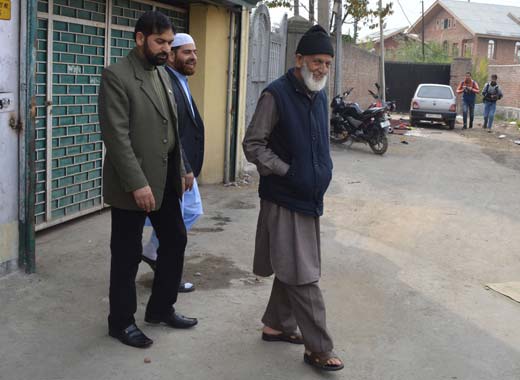They have different roles and status, and ideologies too. But all the three have one thing in common, asking community to contribute for rainy days. Police’s Welfare Fund may have operational problems but is an astounding success. The government takes the same spirit to create a Cancer Treatment Fund. And top separatist leader Syed Ali Shah Geelani is insisting for creation of bait-ul-maal at local levels. A Kashmir Life report

One of the many organisations that got a boost during turmoil is the J&K Police. From a small force in the halcyon days, it metamorphosed into a huge organisation that right now must be having around 80,000 personnel and another 30,000 working as special police officials, village defence committee members and undercover agents. The turmoil fetched it some of the best addresses across the state along with the huge government attention. It obviously is the major spender of public money and for 2010-11the home department will require a whopping Rs 2095.16 crore of which most will go to the police.
But it comes at a cost. It lost over a 1500 of its constabulary, SPOs and VDC members in last twenty years. Given the risk it entails to be a policeman, the organisation came up with the idea of having its own welfare fund. It is from this fund that the police are paying six lakh rupees to the family of its members that are killed or die while serving the organisation.
It was a question by a legislator Murtaza Khan in the state’s upper house that elicited a lot of information about the welfare system. The state police operates as many as eight welfare funds – central police welfare fund, central police sports fund, contributory welfare fund, retired policeman’s welfare fund, range welfare fund, central police education fund, J&K police pariwar fund, and contributory welfare fund of SPOs. All these funds have cumulative fund availability of Rs 62,38,11,273 as on Jan 31, 2010 of which Rs 10,18,45,725 is in fixed deposit (see table). That is after releasing Rs 41,90,30,000 to 705 families in last five years.

It is a committee headed by the state police chief that regulates the fund, set up in 1985. These are operated by the AIG Welfare, an SSP rank officer in the police headquarters. The central police welfare fund is un-audited and lacks any statutory provision. Police, however, say they have laid down a proper system for its expenditure. The police deduct Rs 222 from a cop and Rs 318 from the gazetted cadres every month and it is becoming a substantial corpus.
Khan, who raised the issue in the Legislative Council termed it a ‘Jagga tax’ that lacks legal sanctity. Law and Parliamentary Affairs Minister Ali Mohammad Sagar said the policing is always a high-risk task and the creation of a fund is just an organisational response to the problem. From the fund, he said, the police are helping the families of its members, also the retired personnel who are in distress. Scholarships to the kids of the cops also go from this fund. But Khan insisted that state police chief cannot be permitted to regulate this fund. There are even allegations that part of the funds find its way into the organisation of certain festivals that have nothing to do with the welfare of the police.
The larger story is that police being a major organisation has successfully created a success story – getting contributions from its members and spending it on the welfare of its members in distress. This will be over and above the ex-gratia compensation that the families of slain cops get. Khan’s points are about transparency in managing the fund and creating legal non-partisan authority to manage it.
Finance Minister Abdul Rahim Rather is following the same concept if not the same methodology. In his budget speech, he unveiled his government’s Cancer Treatment and Management Fund. “Cancer is a malady which cannot be handled merely by making available infrastructure and diagnostic facilities in government institutes or private sector mainly because the treatment and management of cancer is expensive and beyond the financial means of poor and even middle class families,” Rather said in his speech. He started the fund by contributing one crore rupees to it and appealed employees of the state government to contribute Rs 10 to Rs 50, a month to this fund purely on voluntary basis. He will be instructing the DDOs to deduct this much from the employees’ salaries and any employee who will not like to contribute has to write to DDO that deductions to his salary may not be made. The fund that in coming days will get income tax exemption will also seek voluntary donations from individuals outside the government as well.
It is a good move and within a couple of years it can create a substantial corpus. A good amount could easily be negotiated with the cigarette manufacturing companies who sell around Rs 1000 crore products in the state a year. Management of this fund may also become a huge question mark if the “help” was linked to the party affiliations and the politicians were given the charge. Its rules and regulations are yet to be made public so commenting on its operations might be too premature.
Cancer, obviously, has become a major killer in J&K. In 2009, according to SKIMS’s leading gastroenterologist Dr Showkat Zargar, there were 2968 fresh cancer cases while 30832 received a follow-up treatment. Half of the fresh detections were GI malignancies. Terming Kashmiris “genetically predisposed” towards GI tumours, Zargar said Kashmir tops the stomach and food pipe cancers in India. Lung and breast cancer make the next major chunk and invariably 70 percent cases are detected when they have crossed the curative stage. South Kashmir has more incidence of cancers than north Kashmir. Doctors say the lung cancer is gradually increasing and with the incidence that it has maintained, it is possible that it will surpass the lung and food pipe cancers in coming years.

Former chief minister Mufti Muhammed Sayeed in 2004 tried to create a parallel system. Over 100 non-resident Kashmiri doctors who flew in for a summit in Srinagar were suggested to “repay part of the debt that they owe to the society” by creating a trust for cancer. It did not move behind the headlines and died the next day they took off for the greener pastures. Now, Rather has an idea and what could make it survive is that the idea is local, the contributors are local and it will go to the locals.
It is this idea of involving communities to create responsive and responsible centres that has built many an institutions. How was SKIMS set up? Sheikh Abdullah during his days of ‘wilderness’ literally begged from door to door to create it and many decades later it is a huge institution that is Kashmir’s only tertiary healthcare centre. It needs lot of improvement to become what it boasts of and claims to be. But the larger reality is that it exists. Muslim Auqaf Trust initially worked on the same principle with a bit of difference that it would get the donations of the individual shrines as its contributions and deploy the funds for creating community infrastructure and helping the needy.
Plainly it is what separatist hardliner Syed Ali Shah Geelani has called for recently for the umpteenth time. He wants that every area should have a Bait-ul-Maal that will take care of the crises that are befalling Kashmir without following a calendar for the last two decades. The recent case was that of Chinkpora in Sopore and Dadsara in Tral. Both the incidents involved fierce encounters between security men and militants holed up in civilian properties. In both the cases JKLF’s Mohammad Yasin Malik was seen on the road raising donations for the victims of the two incidents. Geelani, who visited Sopore, also made some contributions to the families whose houses were mined and brought down and the debris allegedly removed far away from the habitation.
Had the public charity being organised over the years as has happened in other societies especially the conflict spots, Malik or Geelani may not require to be on the road for raising donations or make appeals, every time there is a crisis.
Having an organised system of relief and rehabilitation became a failed statement during the amorphous years of militancy when the local aid agency Hilal-e-Ehmar fell within months of its constitution. But there have been enormous success stories over the years at controlled levels. An impressive chain of orphanages that various young men and women started are an astounding success.
All these institutions mange to raise not less than Rs 20 crore a year and most of it comes in Ramadhan – the Muslim month of fasting. Organising these resources and making charity an apolitical mass movement can change the destiny of Kashmir as long as transparency and neutrality remain its cornerstones.














